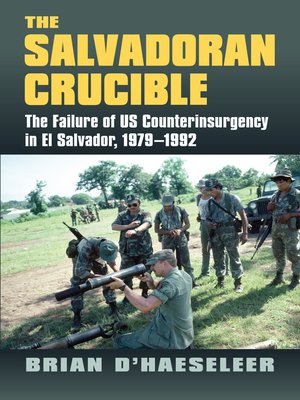The Salvadoran Crucible
ebook ∣ The Failure of U.S. Counterinsurgency in El Salvador, 1979-1992 · Modern War Studies
By Brian D'Haeseleer

Sign up to save your library
With an OverDrive account, you can save your favorite libraries for at-a-glance information about availability. Find out more about OverDrive accounts.
Find this title in Libby, the library reading app by OverDrive.



Search for a digital library with this title
Title found at these libraries:
| Library Name | Distance |
|---|---|
| Loading... |
In 1979, with El Salvador growing ever more unstable and ripe for revolution, the United States undertook a counterinsurgency intervention that over the following decade would become Washington's largest nation-building effort since Vietnam. In 2003, policymakers looked to this "successful" undertaking as a model for US intervention in Iraq. In fact, Brian D'Haeseleer argues in The Salvadoran Crucible, the US counterinsurgency in El Salvador produced no more than a stalemate, and in the process inflicted tremendous suffering on Salvadorans for a limited amount of foreign policy gains. D'Haeseleer's book is a deeply informed, dispassionate account of how the Salvadoran venture took shape, what it actually accomplished, and what lessons it holds.
A historical analysis of the origins of US counterinsurgency policy provides context for understanding how precedents informed US intervention in El Salvador. What follows is a detailed, in-depth view of how the counterinsurgency unfolded—the nature, logic, and effectiveness of the policies, initiatives, and operations promoted by American strategists. D'Haeseleer's account disputes the "success" narrative by showing that El Salvador's achievements, mainly the spread of democracy, occurred as a result not of the American intervention but of the insurgents' war against the state. Most significantly, The Salvadoran Crucible contends that the reforms enacted during the war failed to address the underlying causes of the conflict, which today continue to reverberate in El Salvador. The book thus suggests a reassessment of the history of American counterinsurgency, and a course-correction for the future.







